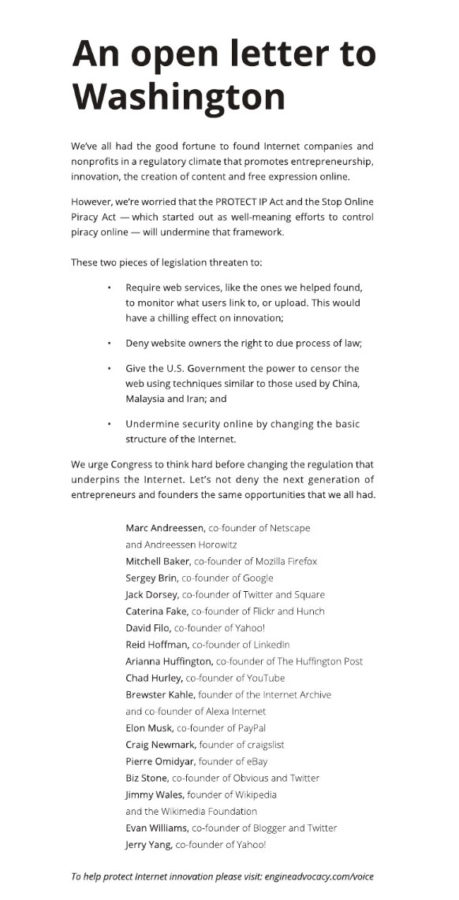Hanton: Hearing on Internet intellectual property bill puts nonfunctional representatives on display
In a last-ditch effort to oppose SOPA, the Stop Online Piracy Act, many Internet entrepeneurs signed a full-page ad placed in major U.S. newspapers.
December 16, 2011
Most of my day yesterday was spent cleaning my room while listening attentively to the U.S. House of Representatives Judiciary Committee discuss the Stop Online Piracy Act, or SOPA. It was a long day of debate for the committee. They started at 10 a.m. EST and ended at 9:30 p.m. EST on Thursday and intend to start at 10 a.m. EST again Friday (9 a.m. central time).
During the hours I spent listening to the hearing, I learned the following things:
- The House Judiciary Committee clerk should be given a raise for reading a 71-page bill cover-to-cover to start her 12-hour day with almost no mistakes.
- Many of the committee members have little to no technical literacy and yet they insist on determining the future of the Internet as we know it without the testimony of any technical experts.
- Members of the committee, notably chairman Lamar Smith, Howard Berman, Bob Goodlatte and Maxine Waters, seem to be at best in staunch opposition to any changes to the SOPA bill as it stands today. At worst, they have been happily silencing any opposition or changes to the bill (Smith seems to chuckle from time to time as they kill reasonable amendments brought forward).
- Sadly the most technically informed people on the committee who are most dedicated to eventually producing good legislation to block intellectual property abuse (Jason Chaffetz and Jared Polis) are also the least-senior. Most of their amendments are simply voted down like clockwork, no matter the content.
- Talk of Internet policy is far too dry for Rep. Steve King of Iowa to bear. He was criticized for tweeting that “We are debating the Stop Online Piracy Act and Shiela Jackson has so bored me that I’m killing time by surfing the Internet.” Jackson was understandably irate later in the afternoon when she heard about the tweet, but was not able to criticize King directly as he had already left the debate proceedings for (what must be) more important matters.
For those who are not familiar with SOPA, it allows the U.S. attorney general to issue an order to have an infringing website forcibly blocked from DNS records (the Internet’s phone book) and IP lookups (Internet addresses) as well as search engines. Another contested point is that it makes any software for circumvention illegal – technically illigitimizing software supported by the Secretary of State that has helped to catalyze events like the Arab Spring movement and political dissent in China.
While many companies dependent on or heavily invested in intellectual property are supporters of SOPA, many Internet companies such as Google, Twitter, and Facebook have come out against the restricting legislation. It is likely that if SOPA is written into law, sites like YouTube would need to become much more proactive at protecting copyrights and other website owners would be burdened with providing a quick reaction to the measures of the law, which seems to tend toward a “guilty-until-proven-innocent” fate for infringing sites.
In truth, it seems like the bill was designed for a single goal – to destroy the Pirate Bay once and for all. But the problem is that rather than providing enforcers with a plan and a sniper rifle to kill the ever-problematic website, the bill simply provides a gattling gun and wording to protect enforcers from civilian casualties caught in the intense crossfire.
And the truth is that it is unlikely that law enforcement and legislation will ever truely kill the Pirate Bay. As I always explain to my friends, the Pirate Bay and other sites are generally supported by the same genre of people who build the amazing firewalls SOPA intends to use to counter pirate sites. In this case, supporters of the Pirate Bay are already finished with a technical workaround to blocks called The Pirate Bay Dancing. The Pirate Bay Dancing hops a user through random proxy servers in other countries when they access a site like thepiratebay.org in an attempt to circumvent any blocking.
SOPA could simply kill all proxy use, but where does the arms race end? As some opponents in the committee noted, this is a never-ending cat-and-mouse game that you won’t win. The only result is that these representatives will decide to strip away our Internet freedoms one at a time until there is nothing left.
I am saddened that 2/3 of the committee will not so much as listen to smart individuals like Jared Polis, who is a self-made Internet millionaire and would rather listen to RIAA and MPAA statistics on piracy. It seems that inevitably the bill will pass out of committee and be voted on by the House, but one thing is certain – the Internet will not go down without a fight.

















